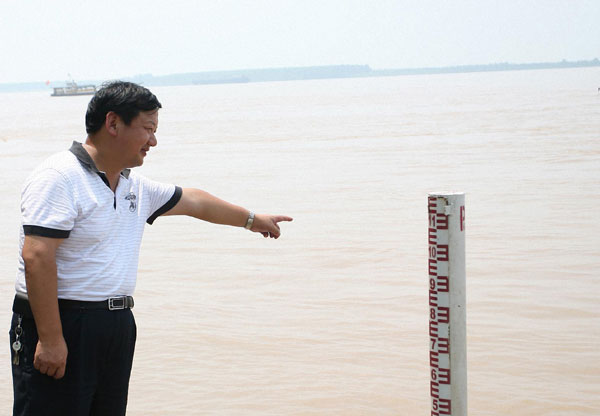Profiles
Calm in the face of rising water
By Guo Rui (China Daily)
Updated: 2010-09-28 07:54
 |
Large Medium Small |
Flood control expert learns to tame nature
 |
|
Liao Quanfu, director of the water resources bureau of Hunan province's Huarong county, inspects the water level of the Yangtze River on Aug 5. [Xu Dianbo/For China Daily] |
YUEYANG, Hunan - Life began to flow in a different direction for Liao Quanfu when his hometown was inundated with water.
The agricultural researcher had only recently graduated from university in 1988 when autumn rain spilled over into large swaths of farmland.
"All the farmland became a vast expanse of water. Crops were under 1.5 meters of water," recalled Liao, born in Huarong county in Hunan province, a place prone to flooding.
He said he used a stick to pick up the rice in the field. "The rice had turned black and smelly."
He was deeply shocked by the experience. Seeing the desperate look in farmers' eyes, he thought he should do something to help control the flooding that destroyed peoples' lives.
So he joined the local flood control effort and has since become an expert.
"It (water conservancy) was so backward, you can't even imagine it. We could only passively accept the disaster," Liao, now 48, recalled sadly.
Though he has learned to handle the pressure associated with his job, his second encounter with a great flood in 1996 almost devastated him.
At the time, he was working in Chaqi town of Huarong, a Dongting Lake area town. During the flood, the town became an isolated island when neighboring towns were submerged by water.
"I was really nervous," he recalled.
About 100,000 people came to fight the flood. Though the population of Chaqi was only 30,000, nearby villagers joined the battle because their homes were under water.
Frightened, many people rushed to buy car tires to use as floatation devices. One day, while working on the embankment, Liao's wife gave him a bicycle tire, saying: "I can't afford to buy you a car tire. I can only give you a bicycle tire as a life buoy. Be careful."
Liao laughed, but was moved at the same time.
Then in 1998, Liao was working in Huarong's Hongshantou town, a key point for flood control on the Yangtze River .
"The flood level increased eight times and we raised the embankment six times," Liao told China Daily.
Liao said he never slept in his bed the entire year, but stayed in an old jeep. "Every day I drove the car to the most dangerous areas, which let me keep an eye on the conditions."
The old jeep was so decrepit that every night Liao endured bites from mosquitoes that came in through the window he couldn't close.
Liao said the experience had a great impact on him, as well as on flood control in China.
After 1998, there was a more profound understanding of and greater input into flood control from central and local governments.
"We now have more technical means of flood control," Liao said. "The Three Gorges Dam has also played a role in regulating flood control."
The dam has alleviated more than five major flood peaks and played a great role in the anti-flood work on the middle and lower reaches of the Yangtze River.
"Information prediction and scientific scheduling make our working conditions completely different," Liao said.
First-hand information helps form a timely and effective program, which is very useful for flood control staff, he explained.
Liao said he was no longer frightened by an impending flood.
"After a disaster, people easily forget the pain when the wound has healed. But I can't," Liao added. "However advanced the technology may be, people who do flood control can't lose their basic perspective."
Once the flood season passes, he pays more attention to other topics, like how to use of water efficiently and to protect it as a precious resource.
"Perhaps I will work five more years, then I may not worry about so many things," Liao said with a smile.



